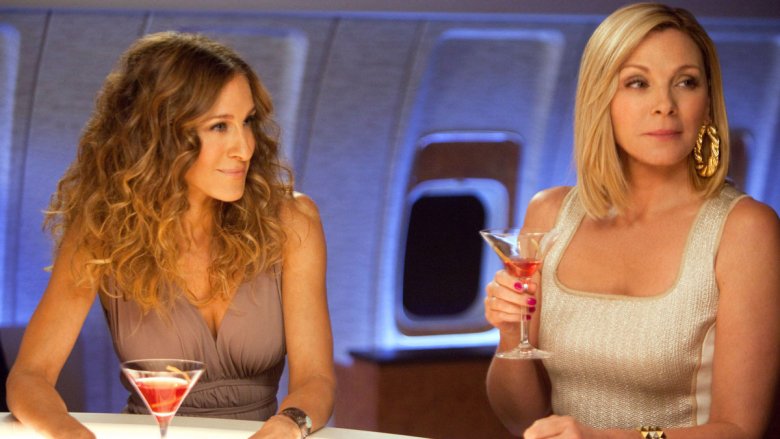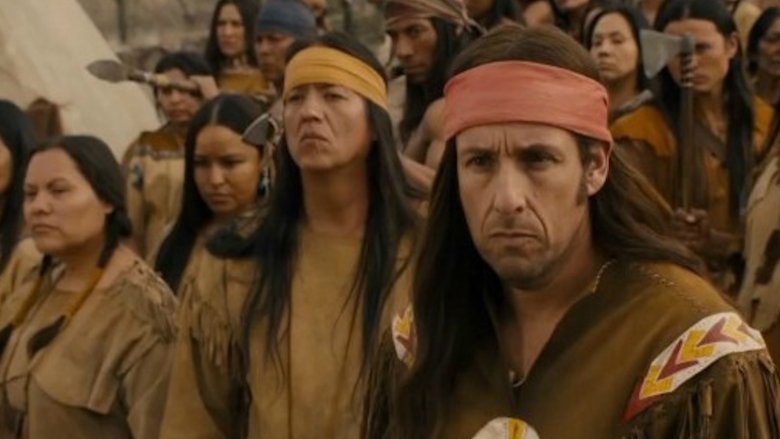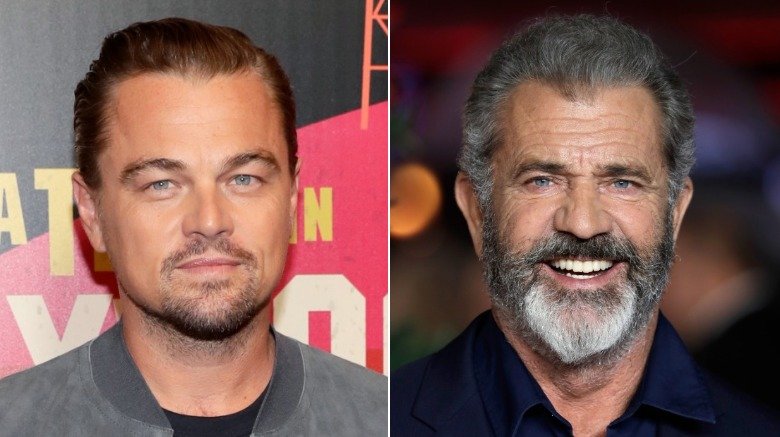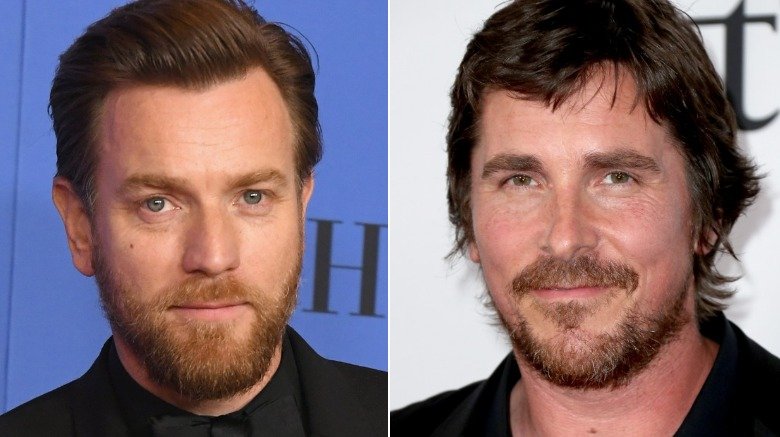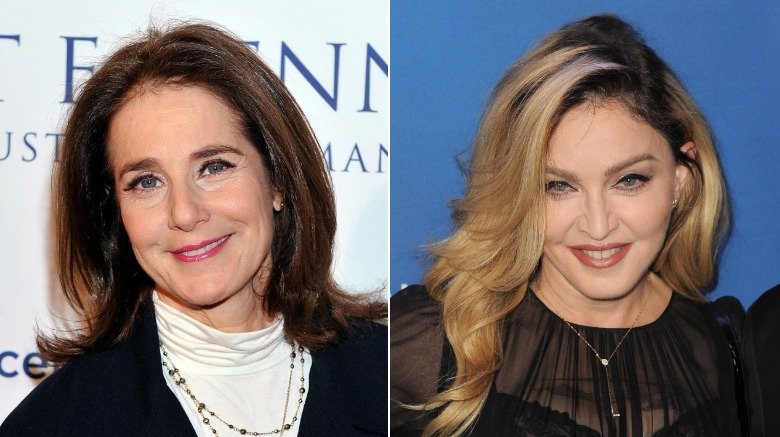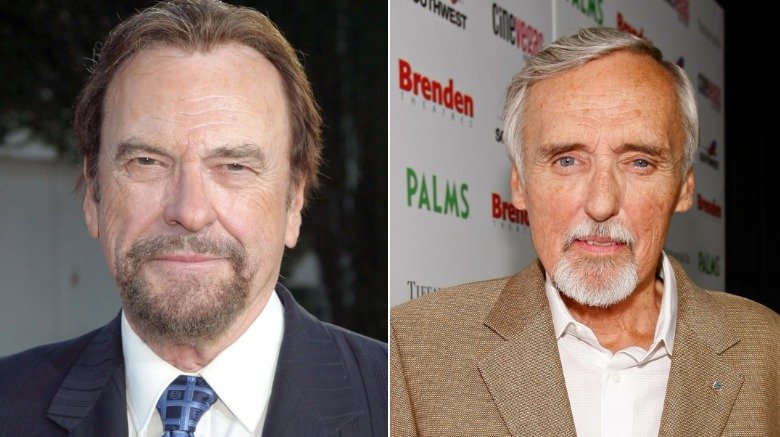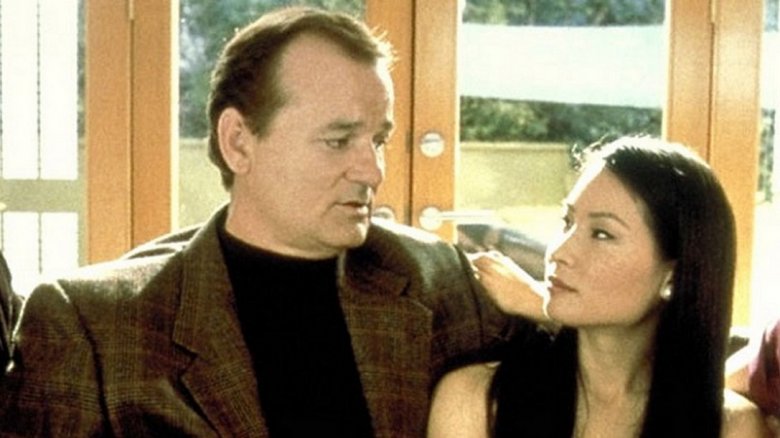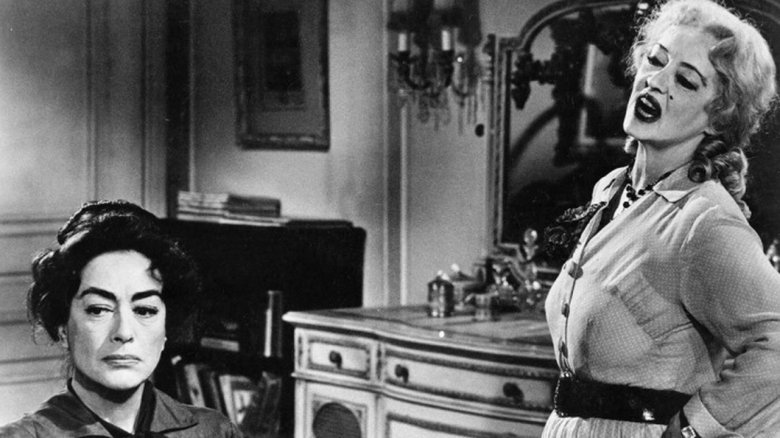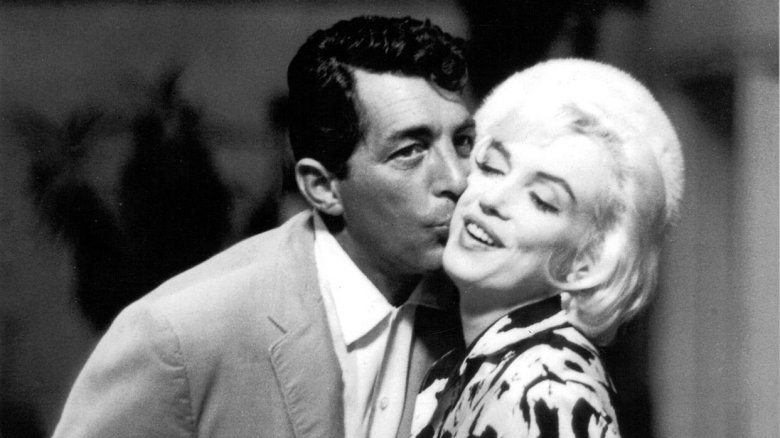Actors Who Quit Roles Because Of Another Actor
You can't make a movie alone. Within the cast of any film, you need cooperation and chemistry for the whole thing to come together, and anyone who's ever had so much as a single coworker understands that sometimes, you just can't get along with that jerk you're stuck with.
When Hollywood's biggest actors find themselves locking horns with co-stars, professionalism usually wins out and the job gets done. Audiences believe in the relationships they see on the screen, never knowing how Ryan Gosling wanted Rachel McAdams replaced while filming The Notebook or how much Leonardo DiCaprio and Claire Danes couldn't stand each other during the making of Romeo & Juliet.
Sometimes, however, the hate runs too deep. It's rare, but it happens. An actor might walk off the set never to return, or they might just refuse to come back for the sequel — and sometimes it even comes to blows between costars. With that in mind, here's a look at some actors who quit a role because of another actor.
Not-So-Happy Gilmore
In April 2015, nine Native American extras and the film's cultural adviser walked off the set of Adam Sandler's The Ridiculous 6. The extras felt a lot of the humor centering on Native Americans crossed the line, particularly when it came to jokes targeting Native American women.
David Hill — one of the extras who quit — said to Indian Country Today Media Network, "I told the director if he had talked to a native woman the way they were talked to in this movie — I said I would knock his ass out."
According to the extras, they voiced their concerns before leaving, but they fell on deaf ears. Loren Anthony — who said he initially refused to work on the film until he was assured the portrayals of Native Americans would be respectful — told ICTMN he went to director Frank Coraci with his issues. "They just treated us as if we should just be on the side," Anthony said. "When we did speak with the main director, he was trying to say the disrespect was not intentional and this was a comedy."
Considering the film's abysmal rating on Rotten Tomatoes, the extras were far from the only ones who didn't find the "comedy" funny.
No trilogy for Sex and the City
Considering how poorly Sex & the City 2 was received, it's a little surprising there were any expectations for a third installment, but star Sarah Jessica Parker said she was "disappointed" in September 2017 upon the announcement that Sex & the City 3 wouldn't move forward.
Rumors pointed to Kim Cattrall as Sex & the City's executioner. Unnamed sources told People that Cattrall was making "outrageous demands" in order to agree to appear in the third film, including insisting that Warner Bros. produce other projects she had in development. Cattrall, for her part, denied the claims. "I never asked for any money, I never asked for any projects, to be thought of as some kind of diva is absolutely ridiculous," she told Piers Morgan in October 2017.
The New York Post's Paula Froelich wrote an article blaming what she called the "mean-girls culture" of Sex & the City. Froelich wrote that Parker and the other co-stars mistreated Cattrall from the beginning of the HBO series, isolating her early on because they were intimidated and jealous of arguably the show's only (at that point) genuine movie star.
After the death of Cattrall's brother, Parker expressed sympathy during a red-carpet interview. Cattrall responded on Instagram, writing, "Your continuous reaching out is a painful reminder of how cruel you really were then and now...You are not my friend. So I'm writing to tell you one last time to stop exploiting our tragedy in order to restore your 'nice girl' persona." She ended the post with a link to Froelich's story.
If you can't take the heat...
In 2010 fans were, well, maybe not shocked, but certainly disappointed when audiotapes leaked of actor/director Mel Gibson going on a racist, hateful tirade over the phone to his former girlfriend Oksana Grigorieva. During the recorded conversation Gibson – among other things — admitted to hitting Grigorieva and threatened her multiple times, including saying he'd burn down her house. In the aftermath, Gibson found himself under investigation by Los Angeles County Sheriffs for domestic abuse, and dropped by his talent agency.
Not quite two weeks later, Leonardo Dicaprio pulled out of Gibson's Viking epic Berserker. Dicaprio was announced to star in the film in December of 2009, and publicly gave no reason for his departure. But RadarOnline, the same site that released the infamous audio tapes, cited an unnamed source who confirmed it was the controversy dogging Gibson that made DiCaprio quit the role.
"Leo has earned the right to pick and choose who he works with," the source reportedly said. "Mel Gibson is not one of them."
American Persuasion
The story of Christian Bale landing the leading role of 2000's American Psycho is long, convoluted, and indicative of how if you think you know what's going on with any particular project in Hollywood, just wait five minutes and you'll be wrong.
Director Mary Harron said when she offered Bale the role, he had already been warned against it because the Brett Easton Ellis novel upon which it was based had already suffered a tempest of controversy. "He said he had all these messages on his answering machine telling him this was career suicide," Harron told The Guardian, "And that just made him more excited." But the studio wanted someone with more star power, and announced that Leonardo DiCaprio was attached to the project at the 1998 Cannes Festival.
DiCaprio eventually bowed out, and Bale was determined to land the role, so even though the studio kept looking elsewhere, he refused other roles for nine months in order to keep his schedule open.
Eventually, execs turned to Ewan McGregor, but he gave it a pass. When GQ asked Bale if he could confirm rumors that it was him who convinced McGregor to say no, he responded, "Absolutely. I phoned a few people and let them know my commitment, let me tell you! I called them all and told them it was my role. Don't touch. Step away. Or if you're not going to step away, understand what you're up against."
Which means, from a certain point of view, you could say Batman used a Jedi mind trick on Obi-Wan Kenobi. And that's pretty cool.
You can keep your playground
In 1992, Penny Marshall directed A League of Their Own, about the short life of the first professional all-female baseball league. The cast included Rosie O'Donnell, Tom Hanks as the Rockford Peaches' often drunk coach, and Madonna, who also provided the film's theme song, "This Used to Be My Playground." Geena Davis played Dottie Hinson, the film's lead role. But as memorable as she was in the film, Davis wasn't the original pick for the lead. That honor went to Debra Winger, who quit the role two weeks before filming.
Winger already had a reputation for not getting along with other cast members, and reportedly had an ugly feud with Shirley MacLaine, who played her mother in Terms of Endearment. In the case of quitting of A League of Their Own, it was apparently an issue Winger had with Madonna; League producer Elliot Abbott told the Baltimore Sun that Winger worried that her presence would "cause a circus atmosphere."
It would be interesting to see how Winger's career trajectory might have changed if she'd endured Madonna's presence. In the years since, she's so thoroughly disappeared from the limelight that it inspired Rosanna Arquette to make the 2002 documentary Searching for Debra Winger.
Not-so-easy Rider
Rip Torn has a reputation for violence, including hitting novelist Norman Mailer in the head with a hammer while filming 1970's Maidenstone. Maybe it was because of this that Dennis Hopper thought he could get away with telling a one-sided version of why Torn didn't make it into Hopper's 1969 road drama Easy Rider when he appeared on The Tonight Show with Jay Leno in 1994. But Torn wasn't about to let him have another easy ride.
Where both Torn and Hopper's versions agree is that Torn was originally cast as George Hanson — the part that ultimately went to Jack Nicholson — and that Torn's involvement ended when an argument between Torn and Hopper got physical at a pre-production dinner. Where their stories diverge is who escalated things, and whether Torn quit or was fired.
According to Peter Biskind's book Easy Riders, Raging Bulls, Hopper told Jay Leno that Torn pulled a knife on him and was subsequently fired. But Torn claimed Hopper was the one who pulled the knife, and that he quit because of it.
After the airing of the Tonight Show episode, Torn sued Hopper for defamation and won to the tune of $475,000.
Fed up with his angels
It's probably not a question that's kept you up at night, but if you're curious about why Bill Murray was replaced by the late Bernie Mac in Charlie's Angels: Full Throttle — the sequel to 2000's Charlie's Angels — it has to do with co-star Lucy Liu, and possibly something to do with a head-butt.
There are different versions of what exactly Murray said that angered Liu, but the basic gist is that while filming a scene Murray said something questioning Liu's acting talent, and Liu responded by throwing punches at him until the crew pulled them apart. In some versions, Murray simply said "You can't act." MTV offers an account that has Murray pointing to Drew Barrymore, Cameron Diaz, and finally Lucy Liu in succession and saying, "I get why you're here. And you've got talent. But what in the hell are you doing here? You can't act."
Whatever was said, Murray and Liu reportedly didn't get along after the incident, leading Murray to turn down the opportunity to reappear in the sequel.
Interviewed by Times of London in 2009, Murray was asked about whether or not he had actually head-butted Charlie's Angels director McG as the director claimed. "That's complete crap!" Murray said. "I don't know why he made that story up...He deserves to die! He should be pierced with a lance, not head-butted."
Hush, sweet Joan
Some of the most memorable Hollywood feuds raged when films were still being made in black and white. The hatred Bette Davis and Joan Crawford shared for one another was so legendary it inspired the 2017 television miniseries Feud.
Davis and Crawford co-starred in the award winning What Ever Happened to Baby Jane? in 1962, and director Robert Aldrich wanted to repeat that success with Hush...Hush, Sweet Charlotte. Both Davis and Crawford signed on, but Crawford came to regret it after suffering a number of humiliations which either were accidents or, as Crawford believed, engineered disgraces on the part of Davis (a suspicion that was confirmed in Crawford's mind when she learned Aldrich and Davis were sleeping together). One example was no one showing up to pick up Crawford from the airport when she landed for a location shoot in Baton Rouge. On the final day of that location shoot, the entire crew pulled up stakes and went back to the hotel while Crawford was left on location in her trailer, asleep.
Crawford feigned illness after this last incident and was hospitalized, though doctors couldn't find anything physically wrong with her. Many speculate that, contractually bound to her role, she hospitalized herself to force Aldrich into firing her — which is exactly what happened. After Crawford returned to the set for a few days and subsequently went back to the hospital, Aldrich replaced her with Olivia de Havilland.
Something had to give
In 1962 Twentieth Century Fox decided to remake the 1940 comedy My Favorite Wife, this time starring Dean Martin and Marilyn Monroe. Titled Something's Got to Give, filming began in April 1962; within three months, Monroe would be fired.
At first, the studio handled Monroe with kid gloves, working around her schedule. Reporting that she was suffering health problems, Monroe often didn't show up for filming or, if she did show up, she was hours late. Fox felt decidedly less forgiving towards the star when they learned that while she was supposed to be too sick to show up for work, she had gone to New York for her famous "Happy Birthday" performance for President John F. Kennedy.
By June 8, Monroe hadn't been on set for seven days, and the studio had had enough. Monroe was fired and, in her absence, Something's Got to Give was left unmade. Dean Martin quit the film, refusing to work opposite any actress other than Monroe.
